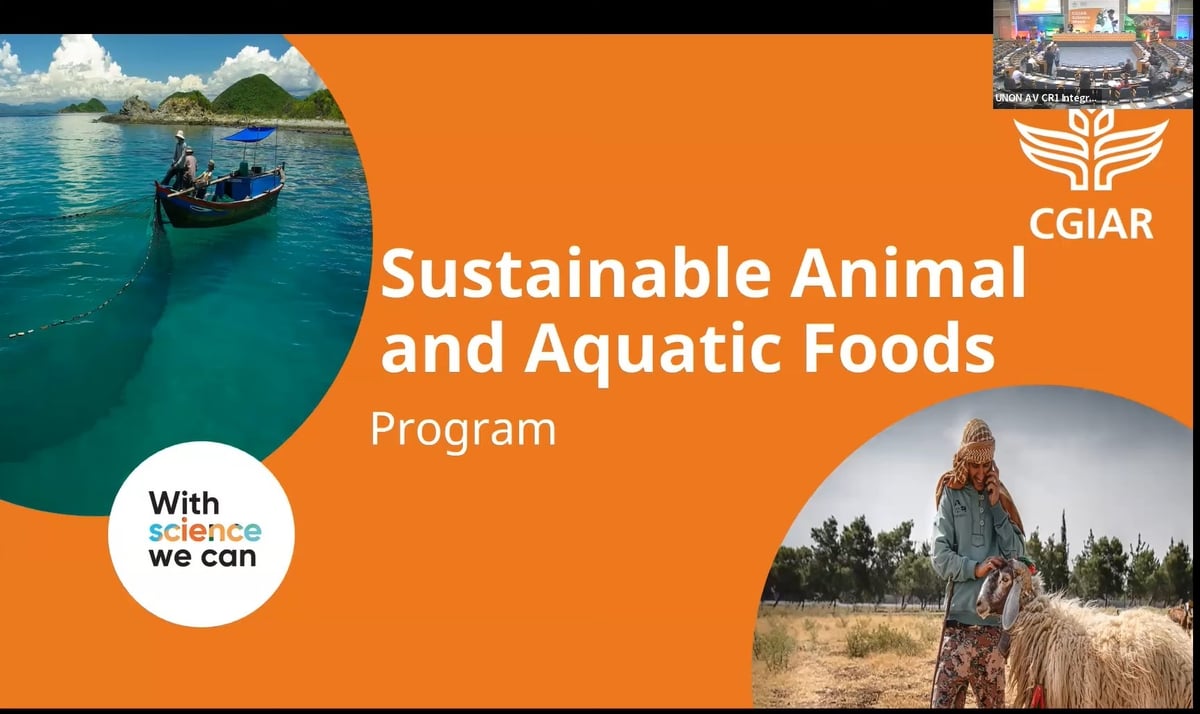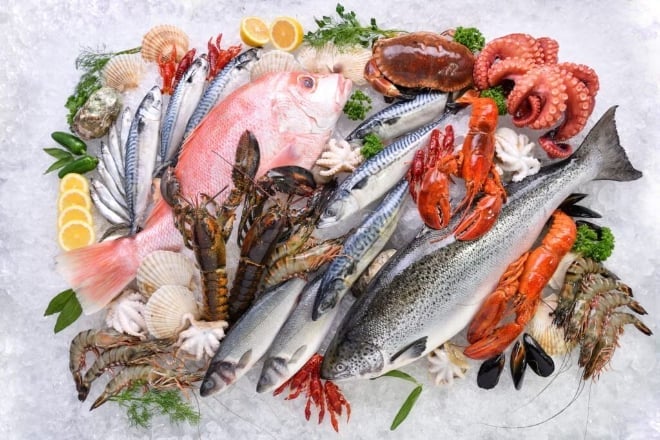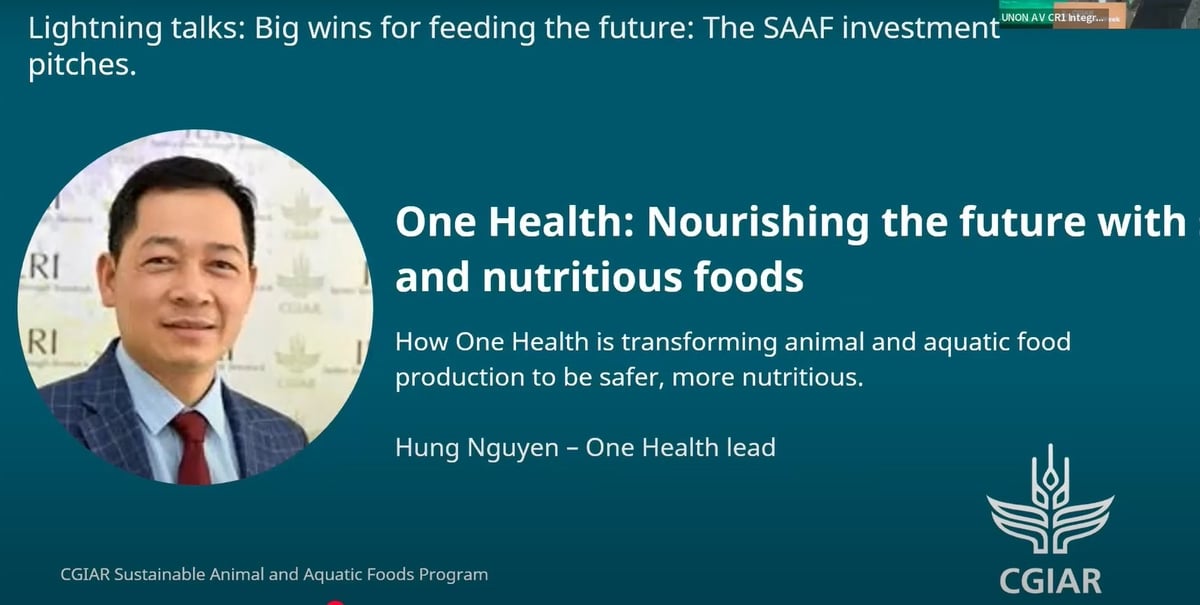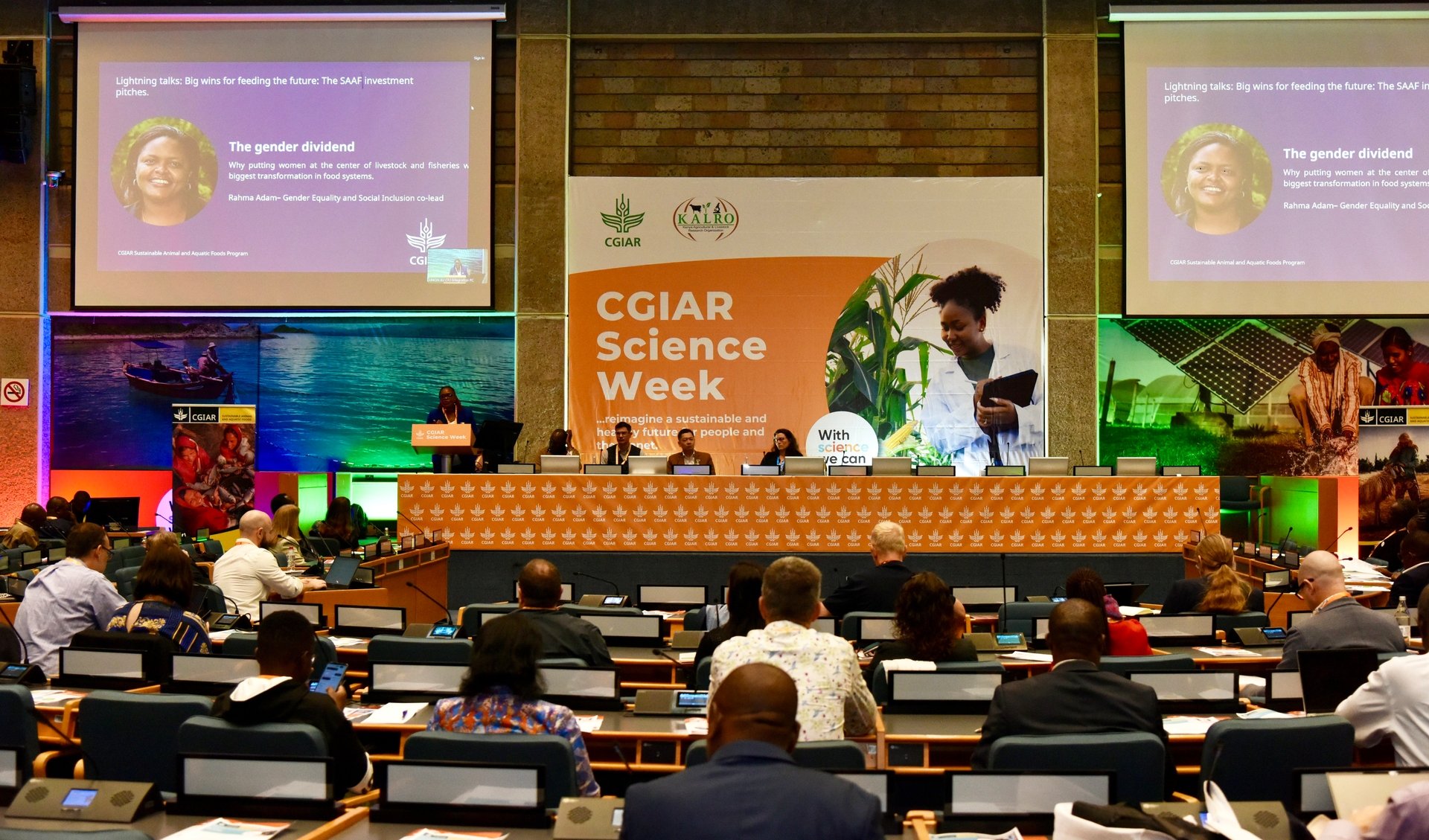May 30, 2025 | 08:18 GMT +7
May 30, 2025 | 08:18 GMT +7
Hotline: 0913.378.918
May 30, 2025 | 08:18 GMT +7
Hotline: 0913.378.918

The seminar on Sustainable Animal and Aquatic Foods (SAAF) within CGIAR Science Week 2025.
This initiative was prominently featured at the thematic session titled “SAAF in Action: Transforming Animal and Aquatic Food Systems for People and Planet”, held as part of the CGIAR Science Week 2025 in Nairobi, Kenya.
Amid increasingly complex climate challenges, food security, particularly the supply of nutrient-rich animal- and aquatic-source foods, has become a pressing concern in many countries, especially in the Global South.
Michael Victor, Head of Communications, Advocacy and Knowledge Management at the International Livestock Research Institute (ILRI) noted that the event brought together high-level policymakers from across the Global South, including ministers and parliamentarians, with the aim of strengthening the connection between science and policy.

Integrated aquaculture systems and non-growth farming models (not aimed at maximizing yield) are potential solutions. Photo: Nutritionsource.
He shared a compelling question raised by a female parliamentarian from a country where the population consumes less than half the recommended annual intake of animal- and aquatic-source foods. She expressed concern about the pressure to meet climate mitigation targets while animal-source foods remain essential to meeting the basic nutritional needs of her people. She emphasized that food choice is a privilege in the Global North, while in many other countries, it is a matter of survival.
In response to this concern, Victor explained that CGIAR’s Sustainable Animal and Aquatic Foods (SAAF) science program was designed specifically to address the practical needs of policymakers in the Global South: how to produce enough nutritious food while minimizing environmental impact and adapting to climate change.
Dr. Sandra Milach, Chief Scientist at CGIAR, highlighted the crucial role that smallholder and skilled farmers play in the production of livestock and aquatic foods, accounting for 70% of livestock outputs in Africa and a significant share of fish production (66% in Africa and 47% in Asia). Despite their vital contribution, these farmers face key challenges such as limited access to new technologies, insufficient investment, and a lack of supportive policies.
The SAAF program is positioned to address these challenges by helping close gaps in technology adoption, improving resilience and inclusive livelihoods, and enhancing access to affordable, nutritious animal-source and aquatic foods. The program also aims to ensure food safety and reduce environmental impacts, particularly greenhouse gas emissions from livestock.
She emphasizes that these goals cannot be achieved without strong engagement from regional, national, and local partners. CGIAR’s role in developing science-based solutions must be complemented by effective collaboration with communities to ensure real-world impact. The session is seen as an opportunity for learning, exchange, and collective action to tackle these pressing global issues.

Mr. Nguyen Viet Hung, leader of ILRI's Health Program, participated in the SAAF workshop with a presentation on One Health. Photo: Linh Linh.
Jacobo Arango, Leader of Climate and Environment at CGIAR, presented a breakthrough approach centered on the use of tropical forages, deep-rooted grasses and legumes. These plants not only effectively sequester carbon in soils through photosynthesis but also help reduce methane and nitrous oxide emissions, two potent greenhouse gases produced by livestock digestion and soil microbial processes.
In addition, tropical forages improve livestock productivity and restore degraded lands, of which over 200 million hectares exist in Latin America alone. This represents a holistic approach that links environmental protection with enhanced agricultural efficiency.
In the aquatic sector, eco-friendly innovations are also gaining momentum. Arango emphasized that seaweed farming, integrated aquaculture systems, and non-growth aquaculture are all promising models. Seaweed cultivation absorbs CO₂ and nitrogen, improves water quality, and provides nutrient-dense food, without requiring land or freshwater resources, which are increasingly scarce.
Meanwhile, integrated aquaculture combines finfish, shellfish, and aquatic plants in symbiotic systems that mimic natural ecosystems and eliminate waste. Non-growth aquaculture, on the other hand, prioritizes ecological stability over production maximization, helping protect vulnerable coastal communities from the impacts of rising sea levels.
However, to scale these models effectively, Arango emphasized the need for strategic investment in processing infrastructure, market development, and private sector engagement. “Sustainable production must go hand in hand with sustainable consumption,” he stated. “A stable market is essential to encourage both producers and businesses to participate in climate-friendly food systems.”
From a public health and food safety perspective, Dr. Nguyen Viet Hung, Head of the Health Program at ILRI, shared that CGIAR has long been working with developing countries to mitigate the risk of zoonotic diseases and to enhance food safety, particularly in traditional markets and informal systems.

Experts are discussing solutions focus on ensuring food security—particularly the supply of nutrient-rich foods from animal and aquatic sources amidst to increasingly complex climate challenges.
Integrated disease surveillance models and community-based laboratories in Kenya and Vietnam have demonstrated practical impact, from identifying disease hotspots to guiding targeted interventions. These efforts contribute to the operationalization of the One Health approach at the grassroots level.
Dr. Hung emphasized: “For One Health to be truly effective, it requires serious and sustained investment.” Studies show that the return on investment (ROI) for One Health initiatives can range from 3:1 to 14:1, meaning that each dollar invested can yield between 3 and 14 dollars in socio-economic benefits. This evidence provides a strong foundation for CGIAR to advocate for expanded funding and real-world implementation of One Health strategies in vulnerable countries.
Translated by Dieu Linh
/2025/05/25/4127-3-073637_820.jpg)
(VAN) Thanks to the promotion from an FAO-implemented project, vegetable production in greenhouses in Moc Chau has seen strong development, from 1.5 hectares in 2021 to nearly 50 hectares in 2024.

(VAN) FAO has recently supported USD 140,000 to implement the project 'Risk mitigation human-animal interface risks through disease control initiatives in pig farming.'

(VAN) The People's Committee of Tra Vinh province has approved an adjustment to the investment policy for the Green Hydrogen Plant project, increasing its area to approximately 52.76 hectares.
![Reducing emissions from rice fields: [2] Farmers’ commitment to the soil](https://t.ex-cdn.com/nongnghiepmoitruong.vn/608w/files/news/2025/05/05/dsc08881jpg-nongnghiep-140632.jpg)
(VAN) Clean rice cultivation model in Thuong Tan commune, Bac Tan Uyen district, is assisting local residents in achieving sustainable agriculture by substantially reducing costs, increasing productivity, and protecting the environment.

(VAN) At the conference to disseminate Resolution No. 68, AgriS introduced its digital agricultural ecosystem and reaffirmed its commitment to accompanying the Government in promoting private sector development and sustainable agriculture.

(VAN) 'Blue Ocean - Blue Foods' initiative is designed to restore marine ecosystems and establish sustainable livelihoods for local communities by cultivating a minimum of 1,000 hectares of cottonii seaweed in the first three years.
/2025/05/21/4642-3-112707_603.jpg)
(VAN) The V-SCOPE project has made direct contributions to three out of six pillars of the Comprehensive Strategic Partnership between Vietnam and Australia.